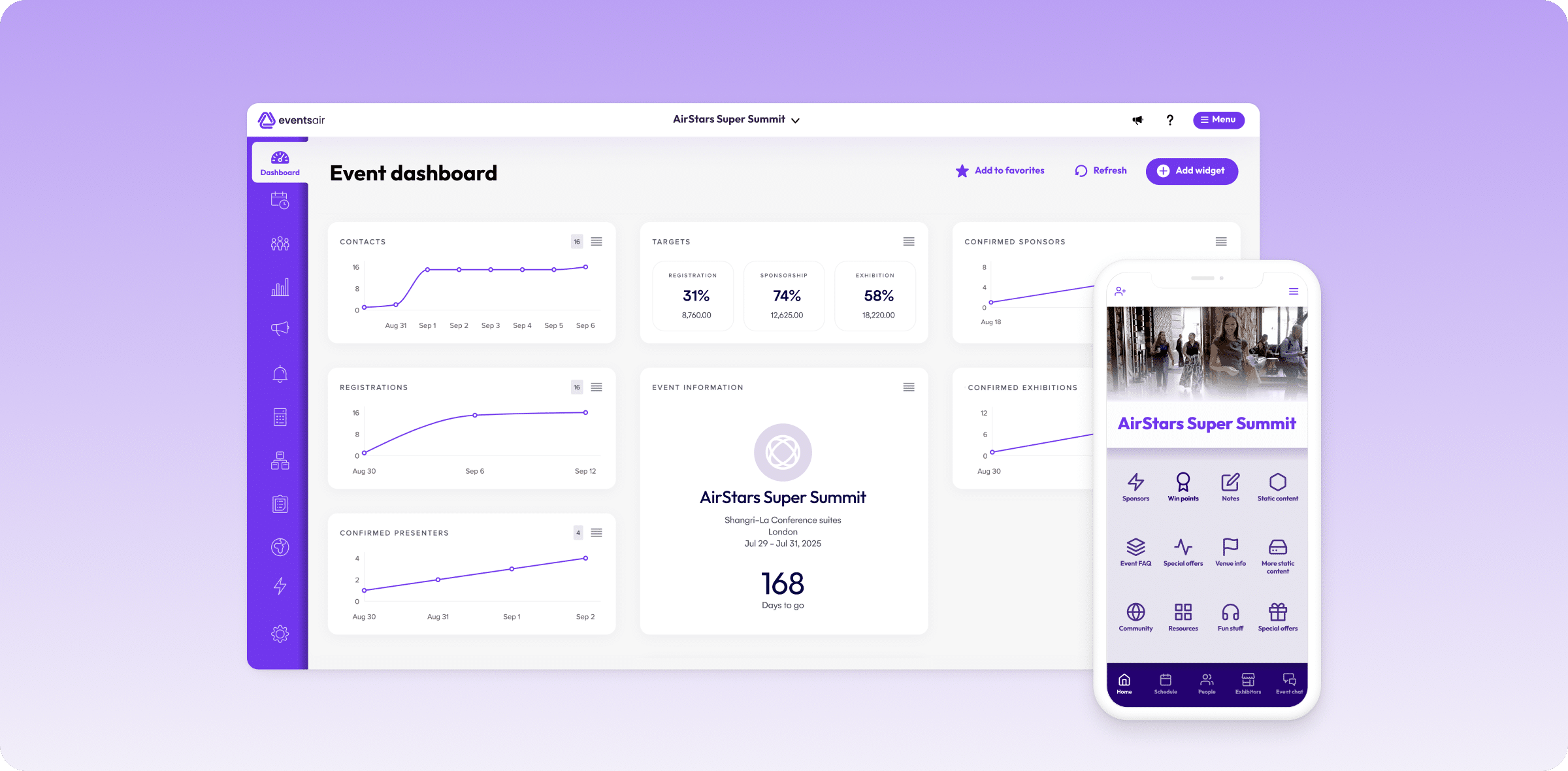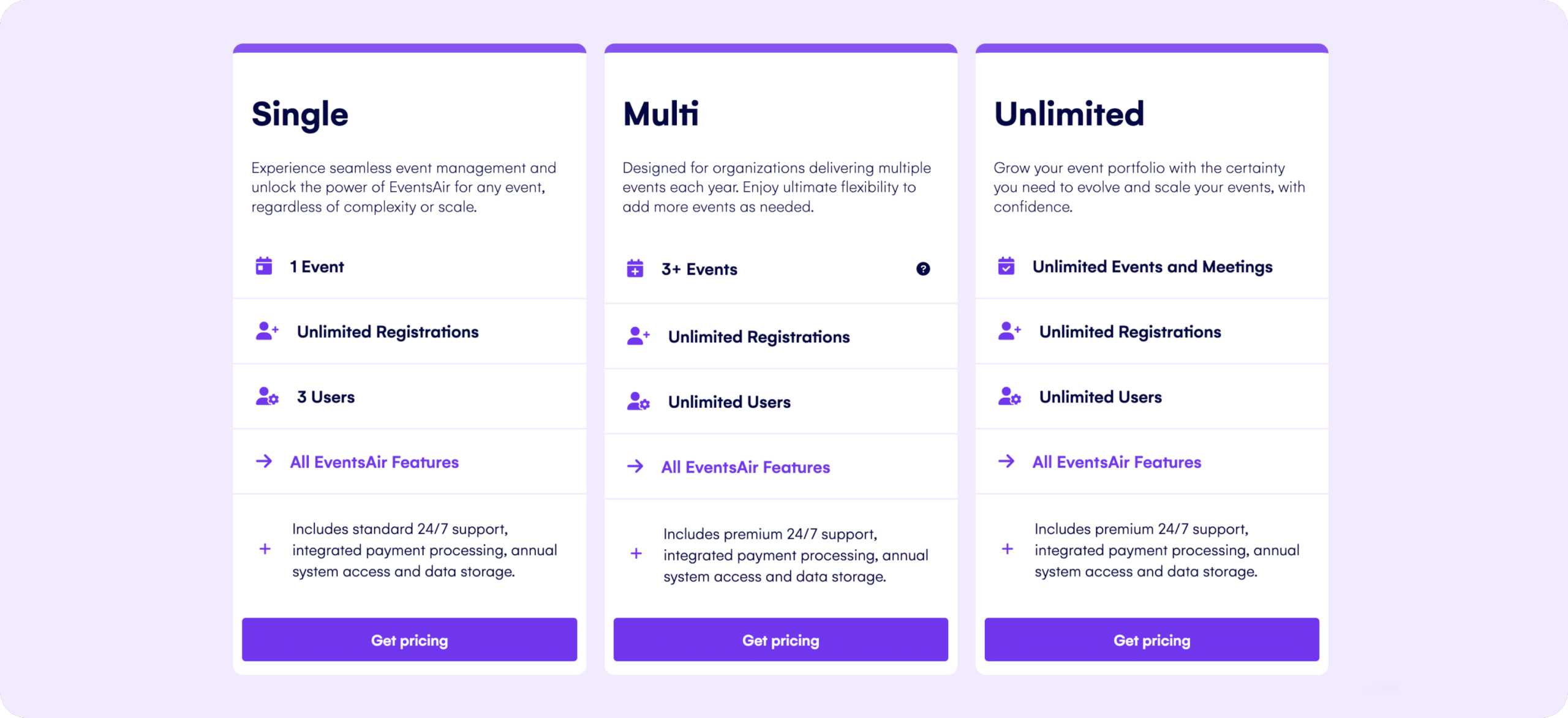We Reviewed the Best Whova Competitors & Alternatives for Successful Event Management

Event management software has revolutionized the industry. Whova stands out as a popular choice thanks to its feature set, user-friendly workflows, and support for in-person, hybrid, and virtual events.
However, many users have pointed out areas where the software could be improved. These commonly mentioned issues include a dated user interface, limited customization options, and occasional difficulties with customer support. While Whova remains a viable option for some event organizers, these factors have led many to explore alternatives that might better suit their specific needs. In this EventsAir guide, we’ll examine top Whova competitors and their offerings to help you make an informed decision.
What is Whova?
Whova is an event management platform that handles registration, marketing, attendee engagement, and post-event follow-up. It offers an event app, online registration, and promotional tools for in-person and virtual events. Trusted by businesses, universities, associations, and government agencies, Whova simplifies event planning while enhancing the attendee experience.
Key features
- Event app: Keeps attendees engaged with personalized agendas, live polls, messaging, and real-time updates.
- Online registration & ticketing: Support ticket sales with custom forms, multiple pricing options, and instant payouts.
- Event management tools: Streamlines logistics with agenda management, speaker coordination, check-ins, and real-time analytics.
- Exhibitor and sponsor management: Ensures maximum ROI with lead capture, business card scanning, and promotional tools.
- Event marketing: Drives attendance with event websites, email campaigns, and social media integrations.
Pricing
Whova’s pricing model is flexible and varies based on event size and selected features. Contact the sales team for detailed pricing information.
Why consider Whova competitors?
Here are some key reasons why you might want to use Whova competitors:
- Limited feature set: While Whova offers basic event management tools, some users find its features too simple or dated for their needs. More complex events often require a more comprehensive and modern platform.
- Customer service issues: Users report unhelpful and inflexible support. Platform changes often lack clear communication.
- Limited for large events: The registration system works well for smaller gatherings but may fall short for conferences with over 100 attendees.
- Cumbersome admin tools: Tasks like printing attendee lists or managing schedules can be frustrating and time-intensive.
- Notification problems: Users struggle to find and clear notifications. Message lists become cluttered and hard to sort.
- Emerging competitors: The event technology market is expanding, giving planners access to cutting-edge platforms with competitive pricing, advanced features, and improved usability.
Top Whova competitors you should consider
- EventsAir
- Swoogo
- RingCentral
- Bizzabo
- Eventtia
- Swapcard
- PheedLoop
- Expopass
- Wild Apricot
- Dreamcast
1. EventsAir
EventsAir is an all-in-one event management platform that empowers organizers to effortlessly orchestrate every detail of their event.
Unlike Whova, our platform is built with professional event planners in mind, providing a comprehensive and deep feature set to support every event type, from start to finish. EventsAir offers the robust tools and flexibility needed to handle complex, large-scale events across in-person, virtual, and hybrid formats.

For planning, EventsAir optimizes budgeting and inventory control, enhances abstract and presentation curation, and transforms check-ins into a seamless process. During the event, it delivers compelling content and sparks meaningful engagement, creating a truly impactful experience.
Our post-event solutions help you analyze performance, craft superior events, and maximize your ROI, paving the way for continuous improvement and success.
Key features
- Registration flows: Design custom no-code registration websites with intelligent forms and powerful conditional logic for attendees, speakers, and exhibitors.
- Event apps: Easily edit and customize your own mobile apps for attendees, speakers, and organizers to access event information on the go.
- Event marketing tools: Craft event websites, launch targeted email campaigns and leverage social media for effective promotion.
- Onsite management tools: Streamline check-in with mobile, self-serve options, and badge printing capabilities.
- Event planning tools: Organize tasks, forecast budgets, track inventory, and manage registrations and payments all in one place.
- OnAir platform: Host virtual and hybrid events with embedded live streams, chat functions, and interactive elements accessible on any device.
- EventsAir Pay: Integrate payment processing with event accounting and budgeting for seamless financial management.
Pricing
We offer customized pricing based on event size and needs, with three tiers—Single (1 Event), Multi (3+ Events), and Unlimited (Unlimited Events and Meetings). Each tier includes all platform features, and you can contact our sales team for a quote.

Pros
- An all-in-one platform covering every aspect of event management
- Easily customize every aspect of your event to meet specific needs
- Suitable for all sizes and types of events
- Modern and engaging design for a better user experience
- 24/7 reliable and responsive customer support
Cons
- Getting the hang of all the features might take some time
2. Swoogo
Swoogo is another event management platform designed for virtual, hybrid, and in-person events. Known for its flexibility and high customization, it offers a strong competitor to Whova, particularly for in-person events.
Swoogo emphasizes ease of use, self-service tools, and automation. It is ideal for event organizers looking for a customizable and simple platform with strong support.
Key features
- Virtual event rooms: Create unlimited sessions, breakout rooms, and expo halls for seamless attendee movement.
- AI integration: Generate polished promotional content and manage Q&A using artificial intelligence.
- Event branding: Customize branding options for virtual events to maintain consistent event theming.
- Audience engagement: Build branded engagement and networking tools for seamless event promotion.
Pricing
Swoogo offers predictable, team-based pricing with unlimited events and registrations:
- Professional Plan: $11,800/year for 1 user, increasing with more users.
- Enterprise Plan: Custom pricing with advanced features like scalable API access and enterprise-grade security.
You can also include Premium Add-ons, such as Extra Custom Domains, Call for Speakers, Attendee Mobile, and others, for specific event needs.
Pros
- Suitable for in-person, virtual, and hybrid events
- Transparent pricing
- Supports real-time analytics
- Specialized enterprise plan for advanced features
Cons
- Not suitable for small events
- Can get very expensive if you need multiple seats and add-ons
3. RingCentral Events (formerly Hopin)
RingCentral Events (formerly Hopin Events) is an event management platform that excels in delivering high-quality, AI-powered events.
The combination of RingCentral’s powerful video suite with Hopin’s all-inclusive event technology has formed a single robust solution for event organizers. Features like multi-track sessions, interactive expo halls, and networking opportunities make this platform a solid choice.
Key features
- Virtual event rooms: Create unlimited sessions, breakout rooms, and expo halls for seamless attendee movement.
- AI integration: Generate polished promotional content and manage Q&A using artificial intelligence.
- Event branding: Customize branding options for virtual events to maintain consistent event theming.
- Audience engagement: Build branded engagement and networking tools for seamless event promotion.
- Integration support: Connect over 40 App Store integrations and APIs to customize event experiences.
Pricing
RingCentral Events pricing starts at $1,490 per license per year for 100 attendees. The cost increases with the number of attendees per event, with tiers for 500, 1,000, and 2,000+ attendees. Contact the sales team for additional pricing details.
Pros
- Delivers professional-grade event production tools
- Suitable for virtual, hybrid, and in-person events
- Inbuilt registration and branding tools
- AI integration adds more productivity
Cons
- Limited integration with certain third-party applications
- Might be overkill for smaller events
4. Bizzabo
Bizzabo is a leading event management platform known for creating immersive in-person, virtual, and hybrid event experiences. Its “event operating system” is designed for large-scale events, providing tools to plan, promote, and produce an event.
With Bizzabo’s extensive range of features, you can efficiently handle registration, marketing, and monitor event performance, all on one platform.
Key features
- Event content: Produce, manage, and distribute event content to keep attendees informed and engaged.
- Event networking: Enable meaningful connections among attendees with robust networking tools.
- Event registration: Customize registration forms and secure payment options for a smooth sign-up process.
- Event marketing: Implement integrated tools like email campaigns and social media integration for effective event promotion.
- Audience engagement: Implement interactive features including live polls, Q&A sessions, and surveys to boost participation.
Pricing
Bizzabo’s Event Experience OS pricing starts at $17,999 per year (billed annually) with a 3-user minimum. It includes unlimited events, registrations, ticketing, email campaigns, and a mobile app. Depending on your needs, there are add-ons that add functionality, but pricing for these hasn’t been disclosed.
Pros
- Customizable event website and registration tools
- Integrates with many marketing tools
- Can handle complex logistics for larger events
- Offers excellent customer support and communication
Cons
- Features may require more time to learn and set up
- Occasional glitches, especially with recording sessions
5. Eventtia
Eventtia is another Whova competitor organizers should consider. This versatile event management platform supports in-person, virtual, and hybrid events. It streamlines planning, execution, and tracking with built-in tools for registration, ticketing, engagement, and analytics. With robust workflow automation and integrations, Eventtia enhances operations and delivers seamless attendee experiences.
Key features
- Registration management: Streamline attendee sign-ups with customizable forms, flexible ticketing, and automated tracking.
- Event marketing tools: Boost attendance with branded email campaigns, RSVP tracking, and personalized reminders.
- Networking and matchmaking: Facilitate meaningful connections with AI-powered matchmaking, 1:1 meetings, and group discussions.
- Virtual and hybrid events: Engage audiences with live streaming, breakout rooms, and interactive exhibitor booths.
- Event analytics: Measure success with real-time engagement reports, session popularity insights, and ROI tracking.
Pricing
Eventtia offers four pricing plans to fit different event needs:
- Essential ($1,500) includes registrations, payments, marketing, and reports.
- Premium ($2,250) adds an event app and virtual platform.
- Networking ($3,500) includes attendee matchmaking and 1:1 meetings.
- Enterprise plan for advanced features.
Pros
- Custom-branded platform with white-label options
- AI-driven attendee matchmaking and networking tools
- Robust hybrid and virtual event features for seamless experiences
- Deep API integrations with CRM and payment systems
- Scalable enterprise features, including role-based access
Cons
- User interface can feel outdated compared to competitors
- Some advanced features require additional setup and training
6. Swapcard
Swapcard is an AI-powered event platform that streamlines planning and execution. It centralizes registration, networking, engagement, revenue generation, and analytics in one system. Designed for on-site, virtual, and hybrid events, it enhances trade shows, associations, and B2B conferences with automated workflows and seamless attendee experiences.
Key features
- AI-driven networking: Connects attendees with personalized recommendations for meaningful interactions.
- Customizable event app: Delivers a branded, user-friendly mobile app for seamless engagement.
- Lead generation tools: Captures and qualifies leads to maximize exhibitor ROI.
- Registration and ticketing: Simplifies registration, ticketing, and attendee management.
- On-site solutions: Supports self check-in and badge printing for smooth event access.
Pricing
Swapcard offers flexible pricing based on event size and needs.
- Starter Plan begins at $570 for up to 1,000 attendees, ideal for mid-sized events.
- Professional and Enterprise Plans offer custom pricing with advanced features and dedicated support.
Pros
- AI-driven recommendations enhance networking
- Customizable event app boosts attendee engagement
- Advanced lead generation tools maximize exhibitor ROI
- Flexible registration and ticketing simplify event management
- On-site self check-in and badge printing streamline access
- Supports 30+ languages for global audiences
Cons
- Some organizers face a learning curve
- Occasional technical glitches during large events
7. PheedLoop
PheedLoop is another Whova competitor on the list. This all-in-one platform gives event planners powerful tools to manage on-site, virtual, and hybrid events. With automation, gamification, analytics, and engagement features, PheedLoop makes event planning easier while enhancing attendee experiences.
Key features
- Event website builder: Provides customizable event websites with embeddable widgets, pre-built templates, and full CSS/JavaScript support.
- Mobile event app: Offers a real-time syncing app for attendee engagement, schedules, and networking.
- Registration and ticketing: Supports custom registration forms, multiple ticket types, and integrated payment processing.
- Badges and check-in: Supports personalized badge creation, QR code scanning, and on-site check-in solutions.
- Live streaming and hybrid tools: Integrates Built-in streaming, interactive virtual sessions, and remote attendee engagement.
Pricing
PheedLoop offers modular pricing, starting at $1 per module per user. Custom quotes are available based on event size and requirements.
Pros
- Cost-effective pricing model with scalable options
- Easy-to-use platform with built-in automation
- Robust reporting and analytics tools for event insights
- Pre-built sponsor and exhibitor profiles for repeat events
- Well-integrated attendee engagement and gamification features
Cons
- Limited telephone support; relies heavily on email assistance
- Some modules lack consistent customization options across features
8. Expopass
ExpoPass is a versatile event platform for planning, executing, and managing in-person, virtual, and hybrid events. It simplifies registration, check-ins, and badge printing. Key features include lead retrieval, attendance tracking, and a mobile event app. With seamless integrations and simple tools, it helps event organizers run smooth events and boost attendee engagement.
Key features
- Event registration: Simplifies the creation and management of registration forms for efficient attendee sign-ups.
- Check-in & badge printing: Facilitates quick on-site check-ins and supports on-demand badge printing.
- Attendance tracking: Provides real-time attendee participation insights for organizers.
- Event app: Offers a mobile app with schedules, speaker details, and networking features.
- Virtual experience: Supports virtual events with interactive tools for remote attendee engagement.
Pricing
Expopass offers custom pricing based on event size and requirements:
- Starting at $4,995 for basic event packages.
- Custom quotes available upon request, ensuring flexibility for different event budgets.
Pros
- Intuitive and easy-to-navigate platform
- Efficient on-site badge printing system
- Simplifies event registration and setup process
- Reliable performance with minimal technical issues
- Affordable option compared to some competitors
Cons
- Limited customization options for registration forms
- Some advanced features found in competitors may be missing
9. Wild Apricot
Wild Apricot is a cloud-based platform for managing events and memberships, designed for associations, nonprofits, and clubs. It combines event registration with a membership system, automating renewals, payments, and communications. The platform includes website, email, and financial management tools, helping organizations streamline operations and maintain a professional online presence.
Key features
- Membership integration: Syncs with membership databases for automated renewals and member-only event access.
- Event registration: Manages sign-ups, attendee lists, ticketing, payments, and waitlists.
- Website builder: Offers a drag-and-drop website editor, customizable themes, and free AWS hosting.
- Email management: Provides mobile-responsive templates, automated reminders, and email tracking.
- Online payments: Supports multiple payment gateways, recurring member charges, and secure transactions.
Pricing
Wild Apricot’s pricing is based on the number of contacts, starting at $63/month for 100 contacts. It also offers discounts of 10% (1-year prepay) and 15% (2-year prepay).
Pros
- Combines membership and event management in one platform
- Automated workflows save time on renewals and communication.
- Drag-and-drop website builder with customizable themes
- Secure and efficient payment processing with recurring billing
- Mobile apps for both admins and members
Cons
- Customer support quality has declined in recent years
- Subscription and ticketing fees may be high for small organizations
10. Dreamcast
The last Whova competitor on our list is Dreamcast, a feature-rich event management platform for virtual, hybrid, and in-person events. It offers a complete solution for organizers, including registration, ticketing, CRM, attendee engagement tools, and live streaming. The platform enhances events with interactive experiences, real-time analytics, and networking solutions.
Key features
- Event registration & ticketing: Manages online and on-site registrations with customizable ticketing options.
- Badge printing & check-in: Supports on-site QR badge printing and fast attendee check-ins.
- Live streaming & virtual events: Delivers high-quality streaming for virtual and hybrid events.
- AI matchmaking & networking: Uses AI-driven tools to connect attendees based on shared interests.
- Gamification & engagement: Enhances event interactivity with live polls, Q&A, and gamified experiences.
Pricing
Dreamcast offers custom pricing based on event needs. Custom quotes are provided after consultation with the sales team.
Pros
- Customizable event spaces for a tailored attendee experience
- AI-powered networking tools enhance attendee connections
- Integrated CRM system for efficient attendee and lead management
- Supports “phygital” events that merge physical and digital elements
- Secure cashless payment processing for transactions
Cons
- Occasional technical glitches during live streaming
- Overly complex for small events (15-20 people)
Wrapping Up
As an event organizer, your event management software can either make or break your event. While Whova has built a strong reputation, it’s important to consider Whova competitors that might fit your needs better—especially as many alternatives continue to innovate, improve, and update their tech.
EventsAir stands out as a strong Whova competitor. Our platform simplifies every stage of event planning and execution, helping you deliver seamless, engaging, and memorable events that impress attendees and stakeholders alike. Request a demo from our sales team today to see how we can transform your next event.



